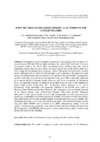Identificador persistente para citar o vincular este elemento:
https://accedacris.ulpgc.es/jspui/handle/10553/121962
| Título: | First record of stranded mesopelagic fishes in the Canary islands | Autores/as: | Sarmiento Lezcano, Airam Nauzet Couret Huertas, María Tuset Andujar, Victor Manuel Lombarte, A. Landeira Sánchez, José María Olivar Buera, Pilar Hernández-León, Santiago |
Clasificación UNESCO: | 240114-4 Taxonomía animal. Peces 310504 Protección de los peces |
Palabras clave: | Myctophids Central-Eastern Atlantic Stranding Otoliths Remote sensing |
Fecha de publicación: | 2023 | Editor/a: | Servicio de Publicaciones y Difusión Científica de la Universidad de Las Palmas de Gran Canaria (ULPGC) | Conferencia: | VIII International Symposium on Marine Sciences (ISMS 2022) | Resumen: | Lanternfishes are the dominant component of mesopelagic fishes living in the ocean between 200 and 1000 m depth, playing a key role in the food web of oceanic ecosystems (Catul et al., 2011). Most mesopelagic fishes perform large diel vertical migrations from the deep-sea zone, where they stay during the day, to the surface where they feed at night, thereby transporting the ingested carbon in the upper productive waters to deep layers. Although there is a trade off between higher food availability at the upper layers and energy cost and predation risk, the incursions towards the surface also implies a transport by currents where they are exposed to stranding risk on the coast. This is especially important in the narrow shelves of oceanic islands where the shelf slope is nearshore. In the present study, we report the stranding of numerous myctophids along the shore of the southeast of Gran Canaria Island during June 2021. In previous studies (Battaglia et al., 2017), mesopelagic fishes strandings were frequently reported at the Sicilian coast (Strait of Messina, central Mediterranean Sea). However, this phenomenon has never been recorded in the Canary Islands coast (Central-East Atlantic). This study provides biological information on the species found, as well as the oceanographic conditions promoting the strandings. A subsample of the better-preserved specimens was used to identify the species, and morphometrics of the body (standard length, SL in mm) and of the sagittae otoliths. The remaining specimens, due to their bad conservation status, were identified through otoliths using the online AFORO web (Lombarte et al., 2006). Temperature, salinity, dissolved oxygen, and net primary production were obtained from Copernicus Marine Environment Monitoring Service (CMEMS) with the aim to understand the oceanographic conditions and discuss the causes of the stranding. | URI: | https://accedacris.ulpgc.es/handle/10553/121962 | ISBN: | 978-84-9042-477-3 | Fuente: | Abstracts Volume VIII International Symposium on Marine Sciences, July 2022 / coordinación, María Esther Torres Padrón, p. 101-102 |
| Colección: | Ponencias |
Visitas
10
actualizado el 10-ene-2026
Descargas
5
actualizado el 10-ene-2026
Google ScholarTM
Verifica
Altmetric
Comparte
Exporta metadatos
Los elementos en ULPGC accedaCRIS están protegidos por derechos de autor con todos los derechos reservados, a menos que se indique lo contrario.
